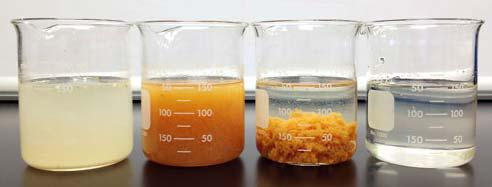8 Painful Points of Chemical Coagulation Treatment Plants

Water treatment has evolved tremendously over several decades. What used to be as simple as boiling water or filtering through sand has become an entire industry in its own right. Many treatment processes are based almost entirely around chemical processes that can be quite complex on occasion. It makes sense. Some of the pollutants in wastewater are compounds that are more difficult to deal with, than simple solids that can be filtered out by physical means. To remove some contaminants, chemical reactions need to occur, to reduce those levels of contamination. Logically, the appropriate types of chemicals need to be added into the solution based on the contaminant. However, these methods of chemical coagulation treatment, can cause painful issues for the facility using them. What kinds of issues?
Below are 8 painful points of chemical coagulation treatment plants:
Cost of Chemical Additives
As stated previously, to cause chemical reactions within a chemical coagulation water treatment process, chemicals need to be added to the solution. Because treatment volumes can be so large, substantial amounts of the necessary chemicals need to be purchased. Some substances are easy and inexpensive to procure, while others are more expensive and hard to procure. But, regardless of price, due to the high volumes needed the operational and maintenance costs can add up quickly.
Sludge Volume
Yet, another downside to adding chemicals during wastewater treatment is how it contributes to the volume of sludge produced. Sludge occurs as a product of most treatment solutions, but the addition of chemicals to influent solutions can add to it significantly. Post water treatment, sludge is typically put through a dewatering process and disposed in an appropriate dumping site. Sludge produced by certain chemical additives such as alum (aluminum sulfate), can be hazardous and require special procedures for disposal.
Cleaning and Maintenance
While cleaning and maintenance is not exactly an issue exclusive to chemical treatment plants. The levels of cleaning and maintenance costs necessary for the continued productivity of chemical treatment plants is typically high. Sludge is quite notorious to clean, and if it is not cleaned out well, it can cause issues with the process. Since sludge is produced in higher volumes during chemical coagulation and treatment processes, it is more to clean.
Disposal Costs
Due to the sludge and other byproducts produced as a result of chemical coagulation water treatment, there are costs associated with disposing of those wastes. Some byproducts have to be sent off to be treated or disposed of offsite. There are separate costs for the transportation, treatment, and the disposal itself. Chemical coagulation typically generates higher toxic wastes that can require special methods of disposal, which has its own extra costs.
Transportation and Handling of Chemicals
Safety is perhaps the most important concern in any facility, but there is an entirely new layer added when concerning the usage of chemicals. Some chemicals used in water treatment are very corrosive and harmful to humans and need to be dealt with very carefully. They require special transportation and storage vessels in addition to all of the necessary safety precautions for any staff that handle them directly.
Complexity of Dosing
Chemistry isn’t an easy subject for many people, and for good reason. It can get fairly complicated determining the proper reactions that need to take place in order to remove the proper contaminants. The removal of several different types of contaminants may need more than one step, as one reaction will remove some constituents, but another is needed to remove the rest. Chemistry is also a very precise art, meaning that too much or too little of something can reduce the efficiency of the chemical coagulation treatment process.
Labor Costs
Many of the previous issues require the use of manual labor. While some human interaction with treatment systems is necessary, chemical treatment systems including chemical coagulation can require more skilled labor to operate effectively. People are needed to operate systems, maintain equipment, clean equipment, transport materials, dispose of waste, and other tasks. Lots of personnel can ramp up operational and maintenance costs.
Capital Costs
Chemical coagulation treatment plants often can have relatively higher overall capital costs associated with them due to the additional support infrastructure required. This includes, the requirement for larger areas of land on which they are to be built. Chemical coagulation treatment plants will also require certain levels of safety precaution that will need to be included in construction.
Genesis Water Technologies, Inc. believes that issues such as these can be avoided by switching from a chemical treatment process to a non-chemical treatment process such as advanced electrocoagulation. Our specialized treatment technology is designed to effectively and efficiently reduce or prevent the issues stated above.
Interested in how sustainable non-chemical electrocoagulation treatment systems designed, engineered and supplied by Genesis Water Technologies could assist your organization? Give us a call at 1-877-267-3699 or email us at customersupport@genesiswatertech.com for a free initial consultation to discuss your application!

